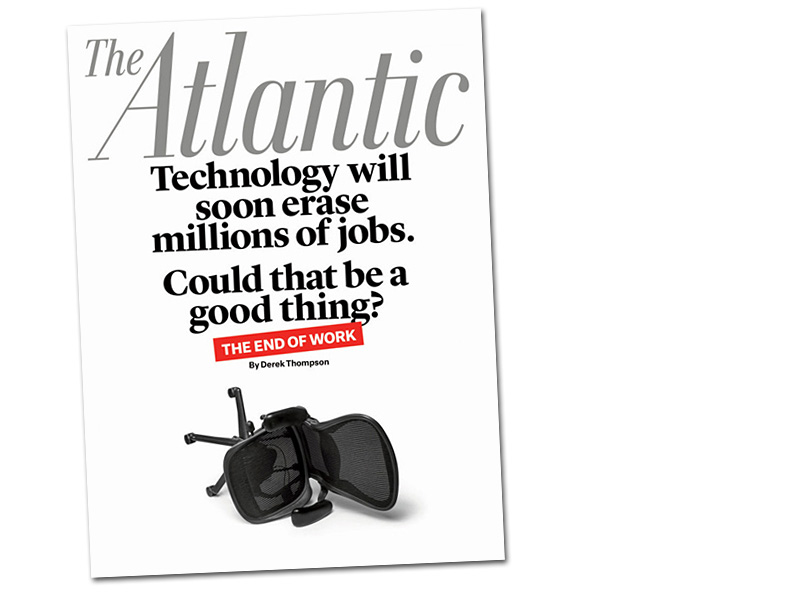The headline and photo on the cover of the Jul/Aug 2015 The Atlantic magazine was chilling, which is why I took so long to read it.
What it predicts is not the end of work, but the end work as we have historically and currently define it. I believe this is true, because it explains so much of what is happening in North America and the world right now. It even explains Donald Drumpf’s [1] rise towards the US Presidency, after it was published.
It’s a big, wide-ranging article, even by Atlantic standards, but it should be read in its entirety. In case you find reading a blog this long to be a chore, here’s the basic thesis:
Technological change will replace millions of North America workers with computer-controlled hardware and software over the next 10 years or so. This sort of thing has historically followed a major recession after the technological change has been underway for a while and that’s exactly where we are right now. So, the end of work as we know it is coming and we’d better get ready for it.
There are utopian and dystopian views on what this transformation will mean, but most likely, it will be a combination of the three outcomes proposed by mostly-utopian “post-workists”:
Consumption – We all become happy consumers of leisure and pursuers of what really matters, like caring for our children, the sick and the elderly. This depends on a world of abundancy for the (possibly re-defined) essentials of life. Not sure how this works out economically, so I really can’t see how this works out at all.
Communal Creativity – We become communities of artists and artisans. Wonderfully romantic and not without some economic underpinning. This was my own wistful utopia six long years ago when this blog started. (See THE COLLABORATIVE ARTISAN NETWORK)
Contingency – A combination of the Gig Economy and the Shared Economy. We cobble together a work living as serial multi-tasking project workers.
I note, with admitted cynicism, that the article’s post-workist philosophers are not self-reinvented factory workers. They are a small group of writers, academics and economists, already successfully living in the Communal Creativity & Contingency futures they are predicting.
The bits most interesting to me:
- We often cling to the idea that there are many jobs where humans cannot be replaced by machines. The article points out that determining the jobs that can be stripped of humans is very hard to predict. Research has shown that machines (meaning AI) have proven to be better psychologists than humans. A stunning example, until you learn the reason is that patients are more honest about themselves when ‘speaking’ to a machine and you can guess why. Human psychologists need to learn to be less judgemental, overtly or otherwise. But this is just a bad example in support of a correct premise. See next for a good example.
- If someone told you five years ago that the Internet search engine company would put self-driving cars on North American roads in 2016, would you have believed them? Most of us would have been wrong. The most logical application of this technology is commercial logistics, which currently employs more young North American males than any other form of work. These boys are already the most inexplicably disaffected and failing group in North American culture. Made less inexplicable by this thesis.
- The word school is based on the Greek word for leisure. [2] The original purpose of education was to free you from the shackles of work to enjoy the things you love. Today, school is to help you get the most golden handcuffs (job) possible. The article makes the very critical point that our institutions of education and government need to be radically re-thought to prepare for the end of work.
What does this have to do with marketing?
Seismic technology-based change came sooner to the marketing world than it has for many others. First to production, then to media. In true Darwinian theory, those that survive are not the fittest (defined here as the biggest or most currently successful), they are the most adaptive.
Everyone in marketing needs to be an artist or an artisan. Creativity, be it artistic, strategic or technological, is still the most powerful way to achieve a business goal, especially when it requires changing or reinforcing consumer behaviour. At this writing, there’s still no algorithm on the horizon for this skill. And as long as there is any form of work, there will be a business objective.
The world of “no work” obviously involves a significant shift in consumer values, never mind the presumed disappearance of the B2B economy. Let’s hope we manage this transition better than the advent of the Internet.
So, is the end of work a bad thing?
Stepping outside the narrow realm of marketing, the answer is YES! A disaster. Humans are at their best when engaged with work, even the type that used to be called menial labour. Yet perversely, modern North American culture continually works to vilify work. US TV Host Mike Rowe spoke eloquently on this topic in a 2008 TED Talk, Learning from dirty jobs.
The North American people aren’t ready for this kind of change. Neither is the economy. Therefore, neither is the government nor any of our major institutions. This kind of disruption tends to lead to chaos, but it will be on a scale we haven’t seen in centuries.
Is there an answer?
We need to rethink the concept of productivity, in the economic sense. We need to stop thinking of productivity gain as automating work, which, since the Industrial Revolution, has been a process of replacing people with machines. But modern technology promises to replace people on such a scale and with such speed that unemployment will rise to unprecedented levels. No one will be able to buy the really cheap things the machines are making and doing. The consumer economy will collapse and from there, complete political and economic collapse follows quickly.
We need to think of productivity gain as creating new wealth through innovation. Innovation that the entire world needs, not just the kids in our suburbs:
- Discover clean petroleum extraction and refining technologies while we work on replacing that with completely sustainable sources of energy.
- Pursue nascent autoimmune and stem cell therapies to cure cancer, and eventually, every other human disease.
- Make agriculture more productive in non-arable and marginally-arable environments, which will most likely involve finding new ways to harness the Earth’s greatest resource, water.
We’re looking at the productivity fraction the wrong way. We don’t become more productive in the long term by working on the denominator—getting rid of the employed people. We need to focus on the numerator—creating more wealth using people and technology together. As you can see, the answer has nothing to do with marketing. Sorry.
- Not a typo. John Oliver will explain here.
- The Greeks also gave us the Olympics, but in their original invention, all the athletes were naked. So some of their original ideas have required some revision.






The Economist has just published an interesting article that follows from the topic of this post. In it, they (curiously) cast doubt on The End of Work any time soon, and explain why the often-proposed option of ‘basic income’ (paying everyone to NOT work) would not work. Read it here:
http://www.economist.com/news/leaders/21699907-proponents-basic-income-underestimate-how-disruptive-it-would-be-basically-flawed
And right after the above, The Economist’s June 25th-July 1st (2016) cover story was “March of the Machines”. It makes the important distinction that technology, and specifically AI, replaces routine tasks all across the skill spectrum. Good news for creative people and good news for anyone who is capable and willing to re-train. Read it here: http://econ.st/2a5Hrrn